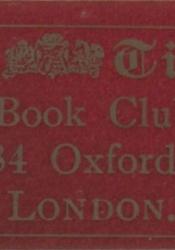Launch of the Times Book Club
The source-text for the COVE edition of Clemence Housman's The Were-Wolf (Bodley Head, 1896) is located in Ryerson University's Special Collections. This copy of the book includes some notable traces of its provenance. A label pasted into the inside back cover reveals that this book once belonged to a member of the Times Book Club, located at 376–384 Oxford Street in London, England. This is a rare example of archival evidence of a Victorian book club.
The brainchild of The Times newspaper's managing director, Charles Frederic Moberly Bell, and advertising manager, Horace Everett Hooper, the Times Book Club opened on September 11, 1905. The book club was designed to increase circulation for The Times newspaper by enticing subscribers with access to a wide selection of books that could be borrowed for free or bought at a signficant discount. Although lending libraries were common throughout Britain, the Times Book Club was the first to lend books for free. Managed by Janet Hogarth (1865–1954), the book club scheme earned money for The Times through the increased number of advertisements brought in by the additional subscribers.
The Times Book Club garnered positive public reception but was less well-received by publishers, who quickly realized the negative implications for their industry. Shortly after the book club opened, an official complaint was filed by the Publishers' Association to the Booksellers' Association. After outgrowing its original premises, the Times Book Club moved to Oxford Street and promoted their new location by advertising a massive book sale on May 1, 1906. The advertisement directly addressed what had now become a "book war," with The Times encouraging readers to end "The Vicious Circle" of high book prices (Boyles 195).
At a meeting on July 4, 1906, the Publishers' Association decided to boycott The Times, withdrawing all advertisements. Subsequently, many publishers blacklisted the Times Book Club. The TImes responded by sourcing their inventory from elsewhere, and publishing articles about price-fixing in the book industry. The book war culminated with the Publishers' Association bringing Hooper to trial, beginning May 5, 1908. He lost the case, and shortly thereafter The Times hired a new manager for the book club, a new advertising manager, and a new circulation director. The Times Book Club then dwindled into obsolescence.

